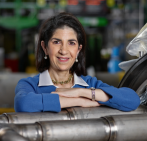The importance of basic sciences for development
Research in STEM has a fundamental role to play in each of the 17 Sustainable Development Goals (SDGs) set by the United Nations General Assembly in 2015, to be achieved by the year 2030. While it is much easier to see the direct impact on economies of applied research in fields such as technology, engineering and medicine, the ‘pure’ or basic sciences (such as some strands of mathematics, physics, chemistry and biology) can also play a pivotal role in building and sustaining knowledge economies, as well as continually updating the theoretical basis on which much applied research will later be founded. A broad variety of theoretical scientific work can contribute to our understanding and our ability to solve problems even years after the research has been developed.
Basic sciences are curiosity-driven sciences but they also have a fundamental role in our lives. They enable the necessary means and tools to address global socio-economic and environmental challenges, such as the water crisis, infectious diseases, ocean deoxygenation and climate change.[1] Despite this, the crucial role of basic sciences is often poorly appreciated, if at all. Further awareness of the critical function of basic sciences needs to be built amongst relevant stakeholders including policy-makers, business and industry, international organizations, philanthropic foundations, university teachers and students, media, and the broader public.
Since February 2020, the world has been disrupted by the COVID-19 pandemic caused by the SARS-CoV-2 virus. But how much worse would the situation have been without the results produced by curiosity-driven scientific research?[2] We know that the infection was caused by a virus, what this virus looks like and what its genetic sequence and variations are because of basic research.
Viruses were discovered at the beginning of the 20th century, the first electron microscope was built in the 1930s and DNA sequencing began in the mid-1970s: basic research is at the root of countless tests, treatments, vaccines, and epidemiological modelling exercises. We even owe high-speed, long-distance communications, which allow us to coordinate the fight against the pandemic and reduce interruptions in education, economic activities, and even the practice of science, to the discovery and study of electromagnetic waves and optic fibers during the 19th century, and the development of algorithms and computer codes during the 20th century. The COVID-19 pandemic is a reminder of how much we rely on the continuous development of basic sciences for a balanced, sustainable, and inclusive development of the planet.
On many other issues, basic sciences have an important contribution to make to progress towards a sustainable world for all, as outlined in the Sustainable Development Goals (SDGs). They provide the essential means to address major challenges such as universal access to food, energy, and sanitation. They enable us to understand the impacts of the nearly 8 billion people currently living on the planet, on the climate, life on Earth, and on aquatic environments, and to act to limit and reduce these impacts.
Keynote Presentation: Fabiola Gianotti
Fabiola Gianotti, Director-General of the European Organization for Nuclear Research - CERN, Switzerland.
'Scientific research: a key asset for the future of society'
Live online presentation, followed by an interview with Gianotti on the challenges and rewards of being a highly visible woman in science
Follow up questions from members.
On 1st January 2016 Fabiola Gianotti became the first female Director-General of CERN. In 2019, she was the first ever DG of CERN to be renewed for a second term of office. Fabiola Gianotti received her PhD in experimental particle physics from the University of Milan in 1989. Since 1994 she has been a research physicist at CERN and since August 2013 an honorary Professor at the University of Edinburgh.





